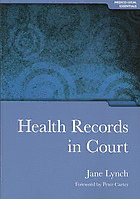
Health records in court PDF
Preview Health records in court
MEDICO-LEGAL ESSENTIALS Health Records in Court MEDICO-LEGAL ESSENTIALS Health Records in Court JANE LYNCH LLB Solicitor Foreword by PETER CARTER General Secretary Royal College of Nursing Radcliffe Publishing Oxford (cid:129) New York Radcliffe Publishing Ltd 18 Marcham Road Abingdon Oxon OX14 1AA United Kingdom www. radcliffe-oxford.com Electronic catalogue and worldwide online ordering facility. © 2009 Jane Lynch Jane Lynch has asserted her right under the Copyright, Designs and Patents Act 1998 to be identifi ed as the author of this work. All rights reserved. No part of this publication may be reproduced, stored in a retrieval system or transmitted, in any form or by any means, electronic, mechanical, photocopying, recording or otherwise, without the prior permission of the copyright owner. British Library Cataloguing in Publication Data A catalogue record for this book is available from the British Library. ISBN-13: 978 184619 222 7 The paper used for the text pages of this book is FSC certifi ed. FSC (The Forest Stewardship Council) is an international network to promote responsible management of the world’s forests. Typeset by Pindar NZ, Auckland, New Zealand Printed and bound by TJI Digital, Padstow, Cornwall, UK Contents Foreword ix Preface x About the author xii Acknowledgements xiii 1 Introduction to health records 1 2 Health records and the law 5 The court system 5 Sources of law 5 Guidelines and codes of practice 9 Court structure 10 Civil law 11 Negligence 11 Criminal law 14 3 Accountability 19 Accountability in a legal context 21 The four areas of accountability 22 Legal and professional obligations 30 4 Will the records stand up to legal scrutiny? 33 Case study 33 5 Good practice for health records 43 The purpose of health records 47 Record keeping is a chore 49 What constitutes the health records and legal documents? 50 Who should write the records? 52 When should the records be written? 53 How much should be written? 55 What should be written? 56 What to include 57 What to omit 58 Don’t keep it in your head 58 Health records should include . . . 59 6 The detail 63 Inadequate detail 63 The rationale 64 Clarity of detail 65 Clear and unambiguous 68 Care and condition 68 Advice given 69 Advice and consent 69 Action 71 Negative fi ndings 71 Frequency of the entries 72 Spelling and grammar 72 Missing information 73 Patient’s details 73 7 How do we record? 75 Protocols and guidelines 75 Aggression 76 Failure by the patient to comply 76 Third party information 76 Telephone advice 77 Complaint 79 Recording consent issues 81 Understanding, language and interpreters 84 Dates and times 84 Authenticate 88 Designated place for recording allergies 90 Standard forms and tick boxes 90 Legibility 91 8 Fact, assumption, professional opinion 93 Fact and assumption 93 Professional opinion 96 9 Amending the records 99 Amending mental health records 99 10 What to leave out 103 Jargon 103 Routine and meaningless entries 103 Gratuitous entries 105 Subjective comments 106 Abbreviations 106 Arrows and dashes 108 Do not squeeze information in 108 Do not leave gaps 108 11 Common errors in the records 111 Transmitting and receiving information 113 Duplication of health records 113 12 Sharing information 117 Inter-professional access to records 117 Communication between healthcare professionals 118 Confi dential information 121 Records used for research and teaching 123 Records used for clinical audit 123 13 Access to health records by the patient 125 Patient’s right of access to health records 125 Withholding information 126 Children’s records 127 Copying letters to GPs and patients 128 14 Systems of record keeping 135 Supplementary records 137 Electronic records 138 15 Further considerations 143 Infection control and the records 143 Mental health records 143 Midwifery records 145 Social care records 146 16 Who owns the health records? 149 Patient-held records 149 Supplementary records 150 Storage of health records 150 17 Health records used to prepare witness statements and reports 155 A statement, report or expert report? 155 18 Health records used as evidence 159 Will your records stand up to legal scrutiny? 159 Untrue or false entries 161 Missing records 162 What is the court looking for? 162 Lack of professionalism 163 19 Defensive writing 165 20 Assessment criteria for health records 167 Glossary 169 Index 175 Foreword For nurses and other healthcare professionals, an understanding of the law and the way in which it impacts upon their roles, responsibilities and the care they give is becoming an increasingly important part of their everyday work. That’s why, in my view, this book is both timely and welcome. Well written, clear and concise, this book provides useful and practi- cal advice by highlighting real-life case studies and workplace examples. Therefore, it provides a much-needed guide for navigating the complexities and intricacies of medico-legal processes, practices and obligations. Engaging with the wider factors and issues that shape and infl uence patient care is essential for all those involved in the delivery of healthcare. I believe this book will not simply provide a practical workplace tool; it will also help to enhance good practice. Dr Peter Carter General Secretary Royal College of Nursing February 2009 ix
